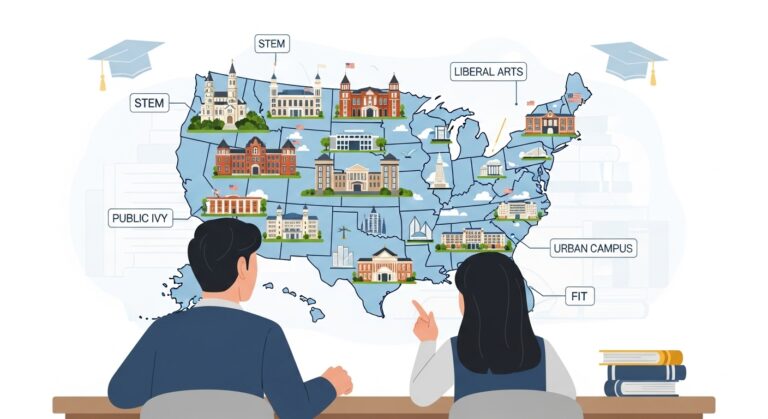Should My Child Apply as Undecided? A Parent’s Guide to Strategy and Success
A Practical Guide for Parents of U.S. High School Students
When students apply to college as Undecided (or Undeclared) Majors, it should not be seen as a passive signal of uncertainty. In fact, when used thoughtfully, applying as Undecided can be a strategic choice—helping balance three important factors: admission chances, financial planning, and flexibility in future major selection.
This guide breaks down what Undecided really means, when it helps (and when it doesn’t), the benefits and risks, and how parents can support their children in navigating this option.
1. What Does “Undecided” Really Mean?
- Different Labels: Colleges may use terms like Undecided, Undeclared, Exploratory, or Open Major.
- Core Meaning: Students have not officially declared a major but show readiness to explore different fields while completing foundational coursework.
- Admissions Perspective: Many colleges admit Undecided students into a general education track, allowing them to explore majors during their first year or two.
Key point: Encourage your child to present Undecided not as “I don’t know,” but as a planned exploration backed by curiosity and preparation.
2. Is It an Advantage or Disadvantage?
The answer depends on the structure of each college.
Colleges that Admit by School/Division (e.g., Engineering, Business, Arts & Sciences)
- Highly competitive majors such as Computer Science, Nursing, or Business are often harder to enter if not applied to directly.
- Students who start Undecided in Arts & Sciences and later try to transfer into these majors may face steep GPA requirements, prerequisite hurdles, and limited seats.
Colleges that Admit All Students College-Wide
- Students complete general education courses first, then choose a major later.
- In this system, being Undecided is usually neutral or only a minor disadvantage.
- However, even here, popular majors often require GPA minimums and specific coursework to declare later.
Liberal Arts Colleges (LACs)
- LACs are naturally designed for exploration. Applying as Undecided feels very normal and can even strengthen the application if a student highlights intellectual curiosity and a thoughtful exploration plan.
Bottom line: Compare each college’s admissions structure and internal transfer policies before deciding if Undecided helps or hurts.
3. Benefits and Risks of Applying Undecided
Benefits
- Stronger Essays: Students don’t need to force a weak connection to one major. A well-presented story of curiosity across fields often feels more authentic.
- Academic Flexibility: Students can build core skills—writing, math, data analysis, communication—before committing to a path.
Risks
- Transfer Barriers: Competitive majors (CS, Business, Nursing, Engineering) may have strict GPA cutoffs and limited spots.
- Course Access: Popular intro courses can fill quickly, which may delay progress without careful planning.
Solution: Review and document internal transfer requirements—GPA, prerequisites, deadlines—well in advance.
4. Which Students Are Best Suited for Undecided?
- Students with 2–3 strong interests but not one clear choice
Example: Math, Economics, and Computer Science.
Strategy: Highlight interdisciplinary skills (analytical thinking, data, communication) throughout the application. - Students aiming for highly selective colleges but lacking depth in one field
Strategy: Present a thoughtful First-Year Exploration Plan to show direction and readiness. - Students drawn to exploration-heavy environments like LACs
Strategy: Emphasize plans to use first-year seminars, faculty advising, and research opportunities.
⚠️ However, if your child is certain about pursuing a highly competitive major at a college with strict transfer rules, it is usually best to apply directly to that major or division.
5. How to Reflect “Undecided” in the Application
Activities & Coursework
- Show balance across four core skills: Writing/Communication, Quantitative Reasoning, Computing/Data, Research/Inquiry.
- Add exploratory depth through reading, online courses (MOOCs), small projects, blogs, or reports.
Essays (Common App & Supplements)
- Convey the message: “Not undecided, but purposefully exploring to solve bigger problems.”
- Suggested structure:
- Spark: A class, project, or book that triggered curiosity.
- Expansion: Efforts to connect 2–3 different fields.
- Action: Coursework, activities, or results from exploration.
- College Fit: Link to seminars, advising, labs, or community resources at that college.
- Roadmap: A 2-year plan for exploration and potential declaration.
Recommendation Letters
- Ask teachers to emphasize intellectual curiosity, collaboration, and problem-solving rather than commitment to a single field.
College List
- Balance with schools where:
- Internal transfer is feasible.
- College-wide admission makes exploration natural.
- LACs encourage open exploration.
6. Financial Aid & Early Admission Strategy
- If comparing financial aid is essential, Early Action (EA) + Regular Decision (RD) allows families to see multiple offers.
- Early Decision (ED) may improve chances but could be risky if applying Undecided at a school where transferring into competitive majors is very difficult.
- Always use each college’s Net Price Calculator before committing to ED.
7. Key Checkpoints by College Type
- Large Public Universities (admit by division): Confirm GPA/prerequisites for internal transfers.
- Private Universities (college-wide or hybrid): Review first-year advising programs and flexibility of the core curriculum.
- Liberal Arts Colleges: Note emphasis on writing, small class discussions, early faculty mentoring, and major declaration typically in sophomore year.
8. A Sample First-Year Roadmap
- Fall Semester: Writing Seminar, Calculus or Statistics, Intro Computing/Data, plus a social science or humanities elective. Keep a “Exploration Journal” documenting classes, guest lectures, and advising notes.
- Spring Semester: Advance one core course (e.g., Statistics → Applied Stats), add a lab science, join a major-interest club, meet with faculty advisors about declaring.
- Summer: Take on a small research project, internship, or coding/data project and complete at least one tangible outcome (paper, report, or portfolio).
9. Parent Action Checklist
- Research each college’s admissions structure and transfer rules.
- Help your child outline a concrete first-year exploration plan.
- Encourage maintaining a portfolio (papers, projects, presentations, coding samples, etc.).
- Build “backup routes” for competitive majors (e.g., pairing Economics + Data Science as an alternative to Business).
- Track scholarship deadlines, NPC estimates, and ED/EA policy conflicts in a single spreadsheet.
10. Frequently Asked Questions
Q1. Does “Undecided” look like a lack of motivation?
Not if students show structured exploration. Colleges often view it as maturity and intellectual curiosity.
Q2. My child is considering CS or Business but isn’t confident—should we choose Undecided?
It depends. At schools with tough transfer policies, applying directly may be safer.
Q3. When do students usually declare majors?
Typically sophomore year, but requirements vary. Check GPA and prerequisite expectations early.
Q4. Does Undecided hurt scholarship chances?
No. Merit scholarships are awarded based on grades, activities, and overall profile—not declared majors.
11. Final Thoughts
Applying as Undecided can be a smart strategy when parents and students carefully evaluate each college’s structure and policies. For highly competitive majors like Computer Science, Business, Nursing, or Engineering, always confirm internal transfer requirements.
Parents can best support their children by encouraging them to:
- Build strong foundational skills (writing, math, data, communication).
- Keep a record of exploration through journals or portfolios.
- Approach Undecided not as indecision, but as intentional exploration leading to the right fit.
Thank you.
📌 For personalized guidance, Elite Prep Suwanee provides detailed counseling tailored to each student’s academic record, activities, and goals.
📧 Contact Us
📞 470.253.1004
Andy Lee
Elite Prep Suwanee, powered by Elite Open School
1291 Old Peachtree Rd, NW #127, Suwanee, GA 30024
✉️ andy.lee@eliteprep.com | 📱 470.253.1004
🎥 YouTube: andyssamTV







